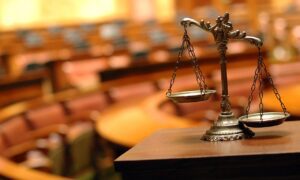In the labyrinthine realm of the criminal justice system, an intricate and multifaceted entity, there resides a fundamental tenet that exerts its dominance – the presumption of innocence, an enshrined legal cornerstone. This bedrock principle, upon which any fair and equitable legal edifice is erected, incessantly grapples with the stark realism of criminal prosecution, thus beckoning the need for a robust citadel of criminal defense. In the impending narrative, we embark on a journey into the enigmatic world of criminal defense, a journey marked by the presumption of guilt, the relentless pursuit of vindication, and a myriad of facets that collectively mold this intriguing domain.
The Presumption of Guilt
The Role of the Accused
In the discerning eyes of the law, every individual accused of a crime luxuriates in the haven of the presumption of innocence, an inviolable refuge until the gale of irrefutable evidence, a veritable tempest, compels a judge or jury to unswervingly accept the guilt of the accused. Until that climactic denouement, the accused basks in the protective shade of this legal umbrella.
However, the presumption of guilt, akin to a ponderous yoke, descends upon the accused’s shoulders. When one stands accused of a transgression, society oftentimes casts a wary and scrutinizing glance in their direction. The public gaze, influenced by a cascade of media coverage, has the power to rupture personal relationships and thrust the accused into an abyss of personal, professional, and societal turmoil, all transpiring long before the gravitas of a verdict dawns. This accentuates the indomitable need for an unwavering bastion of criminal defense.
The Dilemma of Pretrial Detention
One formidable and vexing challenge besieges individuals ensnared in the coils of accusation – pretrial detention. While the theoretical aegis of the presumption of innocence remains steadfast, a disconcerting reality unfurls before many accused individuals as they find themselves ensnared within the steel-clad confines of incarceration, waiting in limbo for the scales of justice to tip. The legal framework, with a semblance of nobility, sanctions this apprehension under the aegis that some accused might pose a flight risk or peril to society. Nonetheless, this practice has, with resounding critique, been chiseled as a de facto declaration of guilt before the proof of innocence.
Pretrial detention, an inexorable juggernaut, catalyzes dire consequences on a personal, fiscal, and societal scale. Livelihoods dissipate like morning dew, families are rent asunder, and lives assume a suspended animation of indeterminate duration. In this maelstrom, the clarion call for a robust defense strategy to secure release or truncate the duration of detention reverberates, a lifeline amid tempestuous seas.
Public Opinion and the Media
The media, an omnipresent maestro, wields a formidable scepter in the shaping of public perception in the realm of criminal cases. High-profile cases, akin to titanic spectacles, often commandeer the front pages of newspapers and the primetime slots on television screens. The accused, ensnared in the public crucible, often metamorphoses into a pariah long before the jury’s hallowed deliberations commence. This premature chorus of public guilt casts a pervasive, inimical shadow over the potential to secure a just trial.
Ask for a criminal defense lawyer, akin to skilled navigators amidst turbulent waters, who must artfully navigate this challenging topography, occasionally beseeching for a change of venue or entreating the court to clothe them in the protective veil of a gag order, a safeguard to sequester the prejudicial maelstrom of publicity. In such circumstances, the profound significance of legal expertise finds its zenith.
Pursuit of Vindication
The Role of Defense Attorneys
The veritable architects of the pursuit of vindication are none other than the defense attorneys. They bear the hallowed mantle of fervently advocating for their clients, with an unwavering commitment to protect their rights and to unfurl a sustained challenge to the prosecution’s case. The relentless pursuit of vindication manifests as a symphony, replete with intricate movements that encompass:
- Investigation and Evidence Gathering: Defense attorneys embark on an indefatigable quest to unearth the labyrinthine depths of the case, an odyssey marked by the excavation of evidence and the meticulous interrogation of witnesses. Their goal is to unearth any irregularities, frailties, or exonerating evidence capable of sowing the seeds of doubt in the prosecution’s edifice. In certain instances, this exhaustive journey culminates in the revelation of hitherto undiscovered evidence, a potential elixir of exoneration.
- Legal Strategies: The development of a robust legal strategy emerges as a pivotal fulcrum in the relentless pursuit of vindication. Defense attorneys, with a surgeon’s precision, may mount a frontal assault on the admissibility of evidence, assail the credibility of witnesses, or contend that the prosecution has fallen short of the hallowed threshold of proof. Legal maneuvers, such as motions to suppress evidence or petitions for a directed verdict, transmute into critical chess pieces on this intricate legal chessboard, indispensable in tilting the scales towards a favorable outcome.
- Negotiation and Plea Bargaining: In select instances, the relentless journey towards vindication unfurls through the treacherous terrain of negotiation with the prosecution, a parley seeking the hallowed grail of a favorable plea bargain. While this covenant may not herald unbridled vindication, it oftentimes consigns the accused to the sanctuary of reduced charges or a more benevolent sentence, thereby shielding them from the relentless onslaught of the legal juggernaut.
The Role of Forensic Experts
Forensic experts, the alchemists of the vindication pursuit, exert a monumental influence on the sagacious utilization of specialized knowledge and skills. Their singular proficiency bestows them with the power to question the validity of forensic evidence paraded by the prosecution. Whether it be the mystical sorcery of DNA analysis, the precision of ballistics, or the scrutinizing eye of fingerprint examination, forensic experts can unfurl a Pandora’s box of insights capable of subverting the very foundations of the prosecution’s case and catalyzing the accused’s triumphant vindication.
The Importance of the Appeals Process
In cases wherein the gavel’s resounding pronouncement has transpired, the pursuit of vindication assumes a resilient mantle that endures long after the trial’s curtains have fallen. The appeals process emerges as an avenue, a portal through which the review of the trial’s proceedings and the legal machinations of the court may unfold. It constitutes a sanctuary, a realm where errors, misconduct, or the serendipitous emergence of new evidence unfurls. This process, a sentinel of justice, serves as a bulwark against the specter of wrongful convictions, emphasizing the unwavering pursuit of vindication.
The Enigma of Criminal Defense
The Ethical Dilemma
Criminal defense attorneys, in their stewardship of the accused, grapple with a Gordian knot of complex ethical dilemmas. Their primary mandate is to champion the cause of their clients with fervor and unwavering resolve. Nonetheless, this mandate often dances perilously close to the precipice of ethical quandaries. It’s the age-old conundrum where defense attorneys may find themselves advocating for clients they privately suspect to be culpable, thereby traversing the treacherous terrain of moral ambivalence.
Yet, it is imperative to underscore that the legal firmament is forged in the crucible of an adversarial process. Within this fiery crucible, the rhapsody of zealous representation is paramount, functioning as a bedrock defense against the state’s immense power and the lurking shadows of potential abuse within the labyrinthine corridors of the criminal justice system.
The Role of Public Defenders
The enigma of criminal defense augments in complexity when we cast our gaze upon the indomitable and often unsung heroes of the legal tapestry – the public defenders. These dauntless legal warriors, ensconced in their noble mission, often find themselves contending with towering caseloads, scant resources, and the relentless tempests of adversity. Tasked with the sacred duty of safeguarding the presumption of innocence for those who lack the means to summon the aid of private counsel, their mission transcends the mundane and catapults itself into the stratosphere of essential justice.
Nonetheless, the frayed edges of public defenders’ resources unfurl a tapestry of concerns, raising compelling questions about their capacity to furnish effective representation. These questions evoke a symphony of echoes reverberating through the hallowed chambers of fairness within the system, particularly for those bereft of the means to enlist the services of private legal vanguards.
The Impact of Criminal Justice Reforms
The enigma of criminal defense becomes ever more intricate when it intertwines with the wider panorama of criminal justice reforms. Ongoing dialogues about the reform of bail systems, recalibrations of sentencing guidelines, and the bold proclamation for the eradication of cash bail bestow upon us a terrain subject to constant metamorphosis. These reformative tides swell and recede, directly influencing the accused and the strategies implemented by their guardians of the law.
While these reformative edicts aspire to furnish an air of equanimity and benignity within the system, they simultaneously unfurl fresh challenges and novel opportunities for criminal defense. Attorneys, much like adept chameleons, must adapt to the ever-shifting landscapes of legality and contemplate the ripple effects these reform measures may inject into the sinews of their client’s cases.
In summation, the presumption of guilt and the ceaseless quest for vindication stand as the twin pillars of the enigma that is criminal defense. The accused, ensnared within the intricate web of societal suspicion, find respite in the tenacious work of their legal champions, the expertise of forensic maestros, and the refuge of the appeals process. Despite the thorny thickets of ethical dilemmas and the burdens shouldered by public defenders, criminal defense serves as the lodestar of justice within society. As the winds of change continue to gust, with criminal justice reforms shaping the horizon, the enigma of criminal defense evolves and persists, etching itself indelibly as a sentinel of vindication at the very heart of the legal universe.



































